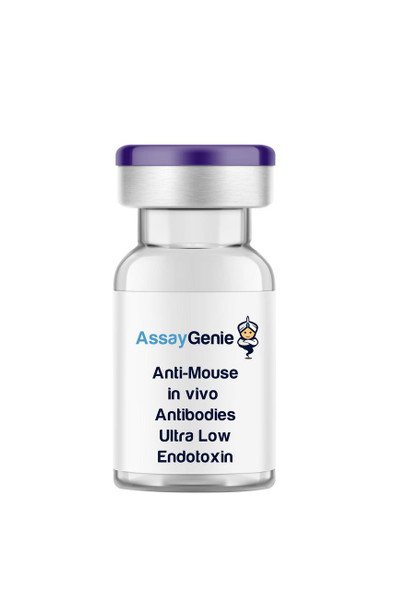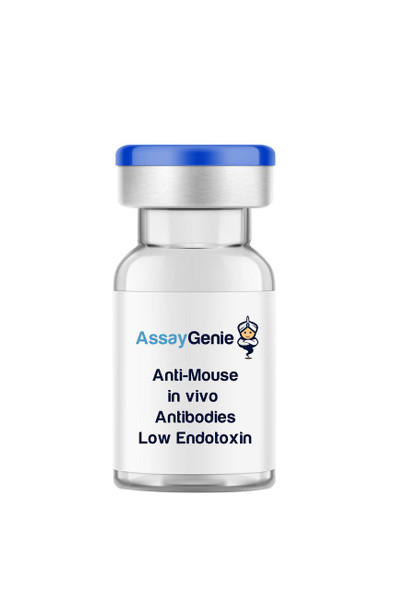Anti-Mouse H-2Kb (MHC Class I) [Y-3] In Vivo Antibody - Low Endotoxin
- SKU:
- IVMB0009
- Product Type:
- In Vivo Monoclonal Antibody
- Clone:
- Y-3
- Protein:
- MHC Class I
- Isotype:
- Mouse IgG2b kappa
- Reactivity:
- Mouse
- Synonyms:
- H-2K
- Synonyms:
- H-2 class I histocompatibility antigen
- Synonyms:
- K-B alpha chain
- Synonyms:
- H-2K(B)
- Synonyms:
- H-2K(K)
- Synonyms:
- H-2K(Q)
- Synonyms:
- H-2K(R)
- Synonyms:
- H-2K(S)
- Synonyms:
- Beta-2-microglobulin
- Research Area:
- MHC & Immune Cell-Specific
- Endotoxin Level:
- Low Endotoxin
- Host Species:
- Mouse
- Applications:
- FA
- Applications:
- ICC
- Applications:
- IP
- Applications:
- WB
Description
| Product Name: | Anti-Mouse H-2Kb (MHC Class I) [Y-3] In Vivo Antibody - Low Endotoxin |
| Product Code: | IVMB0009 |
| Size: | 1mg, 5mg, 25mg, 50mg, 100mg |
| Clone: | Y-3 |
| Protein: | MHC Class I |
| Product Type: | Monoclonal Antibody |
| Synonyms: | H-2K, H-2 class I histocompatibility antigen, K-B alpha chain, H-2K(B), H-2K(K), H-2K(Q), H-2K(R), H-2K(S), Beta-2-microglobulin |
| Isotype: | Mouse IgG2b κ |
| Reactivity: | Mouse |
| Immunogen: | Con A stimulated spleen cells from BALB.B mice |
| Applications: | FA, ICC, IP, WB |
| Formulation: | This monoclonal antibody is aseptically packaged and formulated in 0.01 M phosphate buffered saline (150 mM NaCl) PBS pH 7.2 - 7.4 with no carrier protein, potassium, calcium or preservatives added. |
| Endotoxin Level: | < 1.0 EU/mg as determined by the LAL method |
| Purity: | ≥95% monomer by analytical SEC >95% by SDS Page |
| Preparation: | Functional grade preclinical antibodies are manufactured in an animal free facility using only In vitro protein free cell culture techniques and are purified by a multi-step process including the use of protein A or G to assure extremely low levels of endotoxins, leachable protein A or aggregates. |
| Storage and Handling: | Functional grade preclinical antibodies may be stored sterile as received at 2-8°C for up to one month. For longer term storage, aseptically aliquot in working volumes without diluting and store at -80°C. Avoid Repeated Freeze Thaw Cycles. |
| Applications: | FA, ICC, IP, WB |
| Reactivity: | Mouse |
| Host Species: | Mouse |
| Specificity: | Clone Y-3 recognizes an epitope on mouse MHC class I H-2K haplotypes b, k, q, r, s, but not d. |
| Antigen Distribution: | H-2K is ubiquitously expressed on nucleated cells. |
| Immunogen: | Con A stimulated spleen cells from BALB.B mice |
| Concentration: | ≥ 5.0 mg/ml |
| Endotoxin Level: | < 1.0 EU/mg as determined by the LAL method |
| Purity: | ≥95% monomer by analytical SEC >95% by SDS Page |
| Formulation: | This monoclonal antibody is aseptically packaged and formulated in 0.01 M phosphate buffered saline (150 mM NaCl) PBS pH 7.2 - 7.4 with no carrier protein, potassium, calcium or preservatives added. |
| Preparation: | Functional grade preclinical antibodies are manufactured in an animal free facility using only In vitro protein free cell culture techniques and are purified by a multi-step process including the use of protein A or G to assure extremely low levels of endotoxins, leachable protein A or aggregates. |
| Storage and Handling: | Functional grade preclinical antibodies may be stored sterile as received at 2-8°C for up to one month. For longer term storage, aseptically aliquot in working volumes without diluting and store at -80°C. Avoid Repeated Freeze Thaw Cycles. |
H-2K antibody, clone Y-3, recognizes the major histocompatibility complex (MHC) class I H-2K haplotypes b, k, q, r, s, but not d. MHC class I is ubiquitously expressed on the cell surface of nucleated cells and consists of a 45-kDa type I transmembrane glycoprotein (α-chain or heavy chain) and a 12-kDa soluble protein (β2-microglobulin, β2M). The α-chain consists of three domains (α1, α2, and α3)3. α1 and α2 form the closed antigen-binding groove and bind to 8-10 aa peptides derived from cytosolic antigens. β2M noncovalently associates with α3, which is essential for MHC stability. H-2K plays a critical role in the adaptive immune response by presenting endogenous antigens to cytotoxic CD8 T cells. MHC class I molecules can also present exogenous antigens to CD8 T cells via a process known as cross-presentation. The T cell receptor (TCR)/CD3 complex of CD8 T cells interacts with peptide-MHC class I, which induces CD8 T cell activation and subsequent cell-killing. CD8 molecules also bind to MHC class I, which helps augment TCR signaling. In contrast to CD8 T cells, MHC class I is an inhibitory ligand for natural killer (NK) cells, promoting self tolerance. MHC class I also contributes to the positive selection of CD8 T cells and NK cell specificity.
| Technical Datasheet: | View |
| Protein: | MHC Class I |
| Research Area: | Immunology, Innate Immunity |

| Mouse IgG2b Isotype Control | |
|---|---|
| Clone | MPC-11 |
| Isotype | Mouse IgG2b kappa |
| Endotoxin Level | Low Endotoxin |
Meet the team!
Shane Costigan
Territory Manager & Team Lead
Abdul Khadim
Sales Executive

![Anti-Mouse H-2Kb (MHC Class I) [Y-3] In Vivo Antibody - Low Endotoxin Anti-Mouse H-2Kb (MHC Class I) [Y-3] In Vivo Antibody - Low Endotoxin](https://cdn11.bigcommerce.com/s-rd6ounxcu2/images/stencil/608x608/products/78655/83837/anti-mouse-h-2kb-mhc-class-i-y-3-in-vivo-antibody-low-endotoxin__11576__63093.1706545297.jpg?c=1)
![Anti-Mouse H-2Kb (MHC Class I) [Y-3] In Vivo Antibody - Ultra Low Endotoxin Anti-Mouse H-2Kb (MHC Class I) [Y-3] In Vivo Antibody - Ultra Low Endotoxin](https://cdn11.bigcommerce.com/s-rd6ounxcu2/images/stencil/590x590/products/78656/83838/anti-mouse-h-2kb-mhc-class-i-y-3-in-vivo-antibody-ultra-low-endotoxin__09050__74298.1706545298.jpg?c=1)
![Anti-Mouse MHC Class I (H-2Kb) [AF6-88.5] In Vivo Antibody - Low Endotoxin Anti-Mouse MHC Class I (H-2Kb) [AF6-88.5] In Vivo Antibody - Low Endotoxin](https://cdn11.bigcommerce.com/s-rd6ounxcu2/images/stencil/590x590/products/78998/84180/anti-mouse-mhc-class-i-h-2kb-af6-88.5-in-vivo-antibody-low-endotoxin__33965__35116.1706545532.jpg?c=1)


